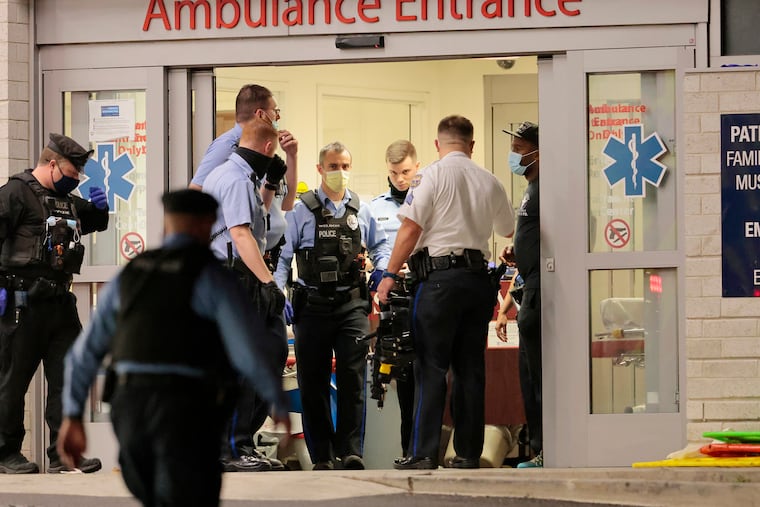After Jefferson hospital shooting, Philly should become a leader in health-care worker safety | Expert Opinion
Emergency medicine physician Priya E. Mammen reflects on the rising abuse endured by medical professionals and urges Philadelphia to expand protections.

Earlier this month, I woke up to the shocking and upsetting news that there had been a shooting inside Thomas Jefferson University Hospital on an inpatient floor. Having worked at Jefferson in the past, and knowing that dear and respected colleagues and friends still work there, made this news hit me deeply. I felt utterly depleted as I learned more details.
In grappling with the tragedy, some people pointed out it wasn’t a mass shooting, but a targeted attack — as if that would put anyone at ease. To me, an unsaid covenant had been forever broken when the shooter pulled the trigger. The hospital — any hospital — is supposed to be a safe space. After a gunman intentionally shot and killed an unarmed employee, can any of us ever see it the same again?
The truth is, though, that hospitals have long felt unsafe for many health-care workers.
As an emergency physician, I know that emotions run high and are often misdirected when patients and families are in the hospital. Once a patient screamed, “Why do they always send me the ones who don’t speak English?” when I walked in the room. I’ve been called every name or racial slur I could imagine, taken every insult hurled my way. All health-care workers — especially women and people of color and my hardworking nursing colleagues — are used to verbal assaults. Even though it is disruptive, we try to understand where it comes from, and we handle it. We almost never report it, as it doesn’t seem to have an impact.
» READ MORE: Nursing assistant gunned down by coworker at Jefferson Hospital was the father of three
Over the years, I have seen these verbal aggressions take on a more ominous and vitriolic tone, and turn to physical threats and actions. It’s not a surprise that this coincides with the escalating divisiveness that may pervade our regular lives outside the hospital.
The nation’s growing distrust of medicine and sciences, personified by health-care workers, not only has put patients at increased risk but has increased the threats and anger directed toward the workforce. With rising gun violence across our city and nation, it’s clear that hospitals are no longer immune to the daily violence in the community. The ails of society no longer stop at our door.
Even more troubling: The Jefferson incident was not unique. Data show that between 2000 and 2015, there were more than 150 hospital-based shootings in the United States, more than half in small hospitals (fewer than 40 beds), and 60% inside the hospital building. According to a report by the American College of Emergency Physicians in 2019, nearly 7 of 10 emergency physicians believe that emergency department violence is increasing.
“Hospitals are no longer immune to the daily violence in the community.”
Our faith in being protected by our employers and the system as a whole has been eroding for years. With the dawn of coronavirus, we have felt unsafe in a different way with each new wave of the pandemic. There’s been the lack of PPE; hospitals reaching capacity, resulting in patients spending days in the emergency department; and significant staff shortages. Before and since, there were pay cuts, layoffs, and news of hospital closures.
It is up to leaders at our hospitals to implement practices that will keep their staff and patients safe. Beginning in 2016, OSHA mandated that all hospitals, regardless of size, incorporate an active-shooter incident plan after determining that hospital-based gun violence had become a “common occurrence.” But more can be done. As the birthplace of American medicine — proudly touted by the College of Physicians — Philadelphia can be the model and leader in this area.
» READ MORE: Jefferson shooting is the latest example of workplace violence in health care
By establishing proper reporting systems for all violence experienced by health-care workers, including verbal assault, hospitals and researchers can understand the true magnitude of the problem and begin to consider solutions. This could also provide a way to recognize when incidences are rising, in order to meaningfully intervene and develop prevention techniques. Each of the individual events of abuse can be traumatic to health-care workers and, as they add up, can lead to burnout. Supporting mental health and addressing the existing stigma around asking for help within the health-care system is fundamental to sustaining the longevity of the workforce. The overall wellness of health-care workers is paramount for the highest level of patient safety and quality of care.
A fundamental tenet for those of us who work in the emergency department, in particular, and in health care, in general, is that we always stand ready for anyone who needs us. We are the safety net. We ask only that we also be protected and kept safe.
Priya E. Mammen is an emergency physician and public health specialist. She is a fellow of the Lindy Institute of Urban Innovation and trustee of the College of Physicians of Philadelphia. She writes monthly for The Inquirer about the future of public health in Philadelphia. @PEMammen